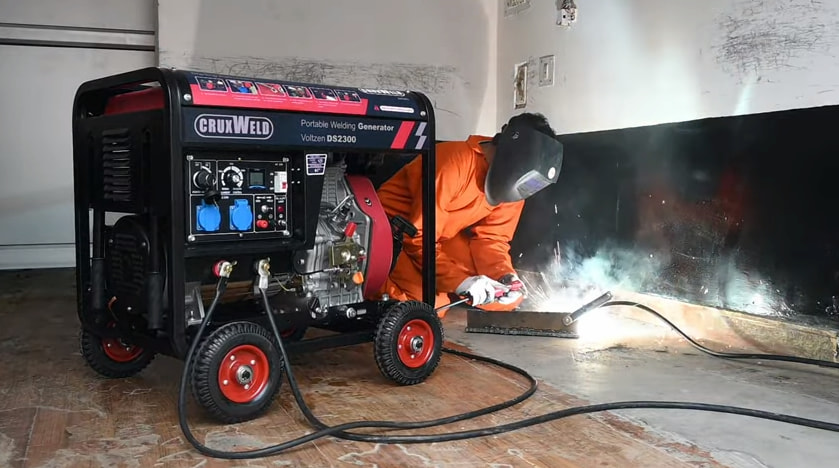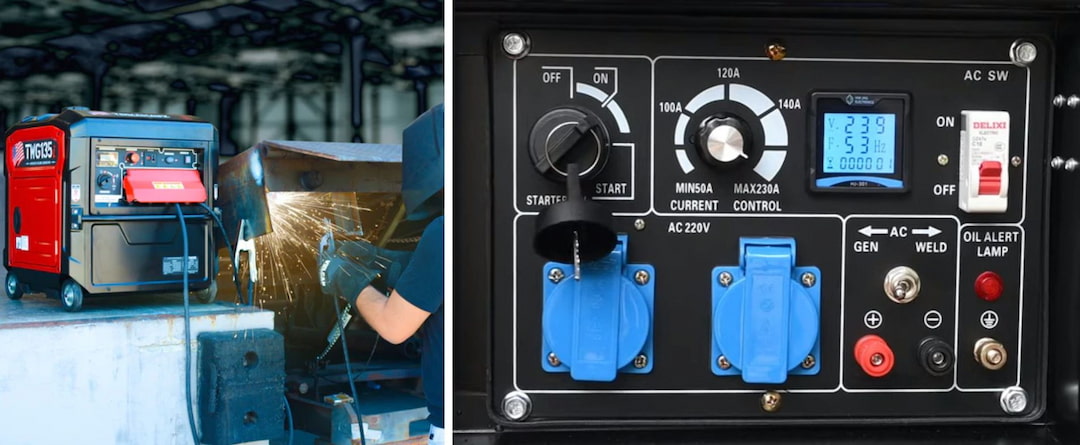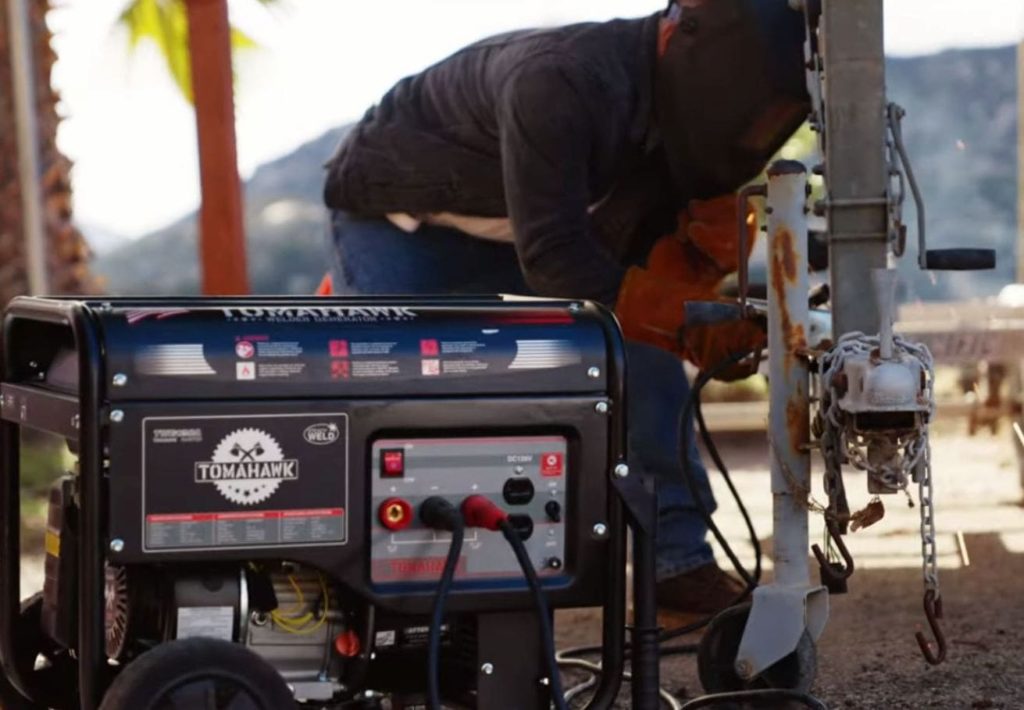Do you struggle to finish a welding job due to a lack of power supply? Welders and metal fabricators need to know how much current and voltage they need, what type of generator is best suited for their specific process, how often they will be using it and all other characteristics related to finding the right generator.
Table of Contents
Making an informed decision can save time, money and even lives if proper precautions are taken. This blog post delves into the details of selecting a generator for welding machine - exploring factors such as amp requirements, runtime length, dirty power protection and more! Keep reading to get more information about which portable generators are ideal for use with welding machines.
Key Takeaways
- Welders and metal fabricators need to select the right generator that meets their specific requirements in terms of power supply, runtime length, dirty power protection, etc.
- Understanding the difference between amps and watts is essential for welders and those needing generators. Amps measure the electric current flowing through a circuit or device, while watts measure electric power.
- Dirty power and runtime concerns are common issues modern-day gadgets and electronic devices face, and considering these factors while purchasing any device is crucial to ensure optimal performance and longevity.
Understanding Amps vs Watts for Welding and Generators
When it comes to welding and generators, understanding the difference between amps and watts is essential. Amps, or amperes, refer to the electric current flowing through a circuit or device, while watts measure electric power. For welding, the higher the amps, the greater the heat produced, allowing for thicker and stronger welds.
On the other hand, watts is the more important measurement to consider when looking at generators, as it indicates the amount of power the generator can produce. By understanding the distinction between amps and watts, welders and those needing generators can make informed decisions about their equipment.
Choosing the Right Generator for Your Welding Processes
When selecting a welder generator for your welding process, you should consider the type of welding you'll be doing, the power requirements of your power tools, and the environment in which you plan to work. If your welding projects involve stick welding or an inverter welder, then look for a generator with an amperage output rating that meets or exceeds your needs.
For outdoor welding or remote locations, a generator with a large fuel capacity and robust frame is preferable for its dependability and power supply. Inverter welders with minimal generator power requirements can be considered if you work in a shop environment. Choosing the right welder generator will ensure you work safely and efficiently with your tools.

Dirty Power & Runtime Concerns
Generators are powerful tools, but they can be costly to run and maintain in the long run. When operating welding machines, there are several factors to consider when selecting a generator for it:
1. Dirty Power: Generators produce "dirty power," the power of variable and inconsistent voltage and frequency. This could damage the welding machines and is unsuitable for some welding processes.
2. Runtime: The runtime of the generator should exceed the required welding time, as any interruption in power could lead to weld failure or defects.
3. Maintenance: Generators require regular maintenance to run efficiently and reliably. It is important to ensure that all moving parts are in proper working order and that fuel tanks are regularly refilled.
4. Cost: Generators can be expensive, with models needing regular refueling and servicing. Additionally, generators require a skilled technician for maintenance, which adds to the overall cost of ownership.

Calculating Welding Amperage Requirements for Different Processes
Calculating welding amperage requirements for different processes is a critical part of the welding process. The proper power equipment must be used to ensure quality welds. Inverter generators and welder generators are both commonly used to achieve this goal. Powering a welder with an inverter or specialized welder generator allows welders to easily adjust the output current and voltage for different welding tasks. By selecting the right power equipment, welders can ensure that their welding amperage requirements are met for each process. This will help them achieve high-quality welds quickly and efficiently. With the right power equipment, welding projects can go smoothly and without issues.
How to Choose the Right Generator for MIG, TIG, Flux Core and Stick Welders
When it comes to welding, having a reliable power source is crucial. Choosing the right generator to power your welding equipment is a decision that can impact the quality of your work as well as your safety. There are various types of welding processes, each with specific power requirements. MIG, TIG, Flux Core, and Stick welders all have different power needs determined by factors such as amperage and voltage.
Choosing a generator that can provide the necessary power output to produce solid and clean welds consistently is essential. I understand that the power requirements of your specific welding setup will help you choose a portable generator that will deliver the needed performance. You can weld confidently and consistently and achieve exceptional results with the right generator.
Tips on Making a Wise Investment in a Generator for Your Welder
Investing in a welding generator is wise if you want to use power tools or other such electrical equipment. Ensure that the same generator can provide enough power supply for your intended purpose and that it meets the wattage requirements of whatever device you use.
Consider the fuel type - gasoline, diesel, or propane - as each option has advantages and disadvantages. Ensuring the generator is portable, durable, and relatively quiet is also important. By taking the time to research and make an informed decision, you can be sure that your investment in a welding generator will provide reliable power for all your welding needs.
FAQs
What is the difference between an AC and DC welding machine?
An AC welding machine produces an alternating current that changes direction periodically, while DC welding machines produce a direct current that flows in one direction. AC welding machines are generally used for thinner materials, while DC welding machines are preferred for thicker fabrics and provide more stable arcs.
What is the most common type of welding machine?
The most common type of welding machine is the arc welding machine, which uses an electric arc to melt and join metals. Within the arc welding machines category, the most commonly used types are shielded metal arc welding (SMAW), gas tungsten arc welding (GTAW), and gas metal arc welding (GMAW).
What is the best type of welding machine for beginners?
The best type of welding machine for beginners is generally a MIG (Metal Inert Gas) welding, also known as Gas Metal Arc Welding (GMAW). This type of welding is relatively easy to learn and produces high-quality welds quickly. Additionally, MIG welding machines are relatively affordable and widely available, making them popular for beginners.
